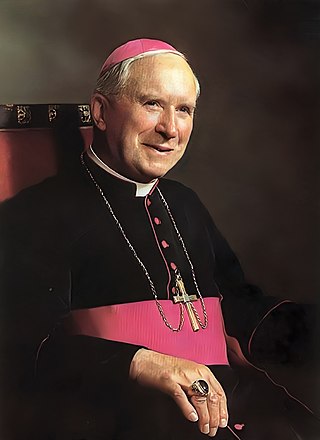
Marcel François Marie Joseph Lefebvre was a French Catholic archbishop who influenced modern traditionalist Catholicism. In 1970, five years after the close of the Second Vatican Council, he founded the Society of Saint Pius X (SSPX), a community to train seminarians in the traditional manner, in the village of Écône, Switzerland. In 1988, Pope John Paul II declared that Archbishop Lefebvre had "incurred the grave penalty of excommunication envisaged by ecclesiastical law" for consecrating four bishops against the pope's express prohibition but, according to Lefebvre, in reliance on an "agreement given by the Holy See ... for the consecration of one bishop."

A prelate is a high-ranking member of the Christian clergy who is an ordinary or who ranks in precedence with ordinaries. The word derives from the Latin praelatus, the past participle of praeferre, which means 'carry before', 'be set above or over' or 'prefer'; hence, a prelate is one set over others.
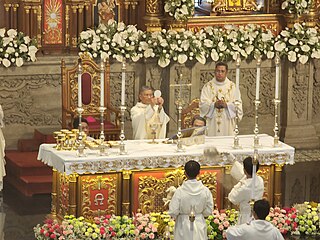
A Pontifical High Mass, also called Solemn Pontifical Mass, is a Solemn or High Mass celebrated by a bishop using certain prescribed ceremonies. Although in modern English the word "pontifical" is almost exclusively associated with the pope, any bishop may be properly called a pontiff. Thus, the celebrant of a Pontifical High Mass may be the pope, any bishop or any other prelate who is allowed to wear pontificals.

Monsignor is a form of address or title for certain members of the clergy in the Catholic Church. Monsignor is the apocopic form of the Italian monsignore, meaning "my lord". "Monsignor" can be abbreviated as Mons. or Msgr. In some countries, the title "monsignor" is used as a form of address for bishops. However, in English-speaking countries, the title is unrelated to the episcopacy, though many priests with the title later become bishops.

A Papal Mass is the Solemn Pontifical High Mass celebrated by the Pope. It is celebrated on such occasions as a papal coronation, an ex cathedra pronouncement, the canonization of a saint, on Easter or Christmas or other major feast days.
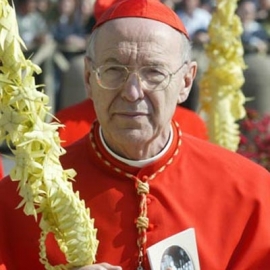
Francesco Marchisano was an Italian Cardinal who worked in the Roman Curia from 1956 until his death.
A Prelate of Honour of His Holiness is a Catholic prelate to whom the Pope has granted this title of honour.
The hierarchy of the Catholic Church consists of its bishops, priests, and deacons. In the ecclesiological sense of the term, "hierarchy" strictly means the "holy ordering" of the church, the Body of Christ, so to respect the diversity of gifts and ministries necessary for genuine unity.
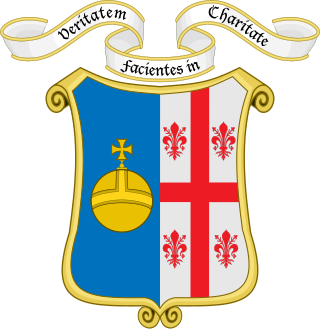
The Institute of Christ the King Sovereign Priest, Latin: Institutum Christi Regis Summi Sacerdotis, abbreviated as ICRSS and ICKSP, is a society of apostolic life of pontifical right in communion with the Holy See of the Catholic Church. The institute has the stated goal of honouring God and the sanctification of priests in the service of the Catholic Church and souls. An integral part of the institute's charism is the use of the traditional liturgy, namely the Tridentine Missal for Mass, the Breviary of John XXIII for the Divine Office, and the Rituale Romanum for other sacraments. The society has undertaken the restoration of a number of historic church buildings.
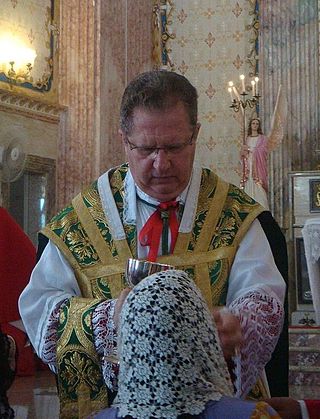
Fernando Arêas Rifan is a bishop of the Roman Catholic Church from Campos, Brazil. Since December 2002 he has been the Apostolic Administrator of the Personal Apostolic Administration of Saint John Mary Vianney, also known as the Priestly Union of Saint Jean-Marie Vianney. For some years before 2001 he was allied with Priestly Union when it defied the Holy See by routinely using unauthorized liturgical forms and associated with the Society of St. Pius X. He helped negotiate the reconciliation of the Priestly Union with the Holy See in 2001.

The Personal Apostolic Administration of Saint John Mary Vianney was established on 18 January 2002 by Pope John Paul II for traditionalist Catholic clergy and laity within the Diocese of Campos in Brazil. It is the only personal apostolic administration in existence, and the only canonically regular Catholic Church jurisdiction devoted exclusively to celebrating the pre-1965 form of the Roman Rite in the area. Its current Apostolic Administrator is Bishop Fernando Arêas Rifan.
In the Roman Catholic Church, protonotary apostolic is the title for a member of the highest non-episcopal college of prelates in the Roman Curia or, outside Rome, an honorary prelate on whom the pope has conferred this title and its special privileges. An example is Prince Georg of Bavaria (1880–1943), who became in 1926 Protonotary by papal decree.

The Institute of the Good Shepherd is a Catholic society of apostolic life made up of traditionalist priests promoting the Tridentine Mass and other traditional sacraments, in full communion with the Holy See. As of 2023, the Institute has 61 priests, 46 seminarians and is active in nine countries over four continents.

In the Catholic Church, a bishop is an ordained minister who holds the fullness of the sacrament of holy orders and is responsible for teaching doctrine, governing Catholics in his jurisdiction, sanctifying the world and representing the Church. Catholics trace the origins of the office of bishop to the apostles, who it is believed were endowed with a special charism and office by the Holy Spirit at Pentecost. Catholics believe this special charism and office has been transmitted through an unbroken succession of bishops by the laying on of hands in the sacrament of holy orders.
Pontifical vestments, also referred to as episcopal vestments or pontificals, are the liturgical vestments worn by bishops in the Catholic, Eastern Orthodox, Oriental Orthodox, Anglican, and some Lutheran churches, in addition to the usual priestly vestments for the celebration of the mass, other sacraments, sacramentals, and canonical hours. The pontifical vestments are only worn when celebrating or presiding over liturgical functions. As such, the garments should not be confused with choir dress, which are worn when attending liturgical functions but not celebrating or presiding.
Precedence signifies the right to enjoy a prerogative of honor before other persons; for example, to have the most distinguished place in a procession, a ceremony, or an assembly, to have the right to express an opinion, cast a vote, or append a signature before others, to perform the most honorable offices.
This is a glossary of terms used within the Catholic Church. Some terms used in everyday English have a different meaning in the context of the Catholic faith, including brother, confession, confirmation, exemption, faithful, father, ordinary, religious, sister, venerable, and vow.
Wach is a Polish and German surname. Notable people with the surname include:

Christopher Charles Prowse is an Australian Roman Catholic bishop. He is currently the archbishop of the Archdiocese of Canberra – Goulburn; appointed to the post on 12 September 2013 and installed as archbishop on 19 November 2013. On 12 September 2016, Prowse was named as apostolic administrator of the Roman Catholic Diocese of Wagga Wagga following the retirement of Bishop Gerard Hanna. On 26 May 2020, Pope Francis announced Mark Stuart Edwards would become the sixth Bishop of Wagga Wagga, however Prowse remained apostolic administrator until Bishop Edwards' installation on 22 July 2020.

Angelo De Donatis is an Italian Catholic prelate. He has been Major Penitentiary since April 2024. He was Cardinal Vicar and Archpriest of the Archbasilica of St. John Lateran from 2017 to 2024.














